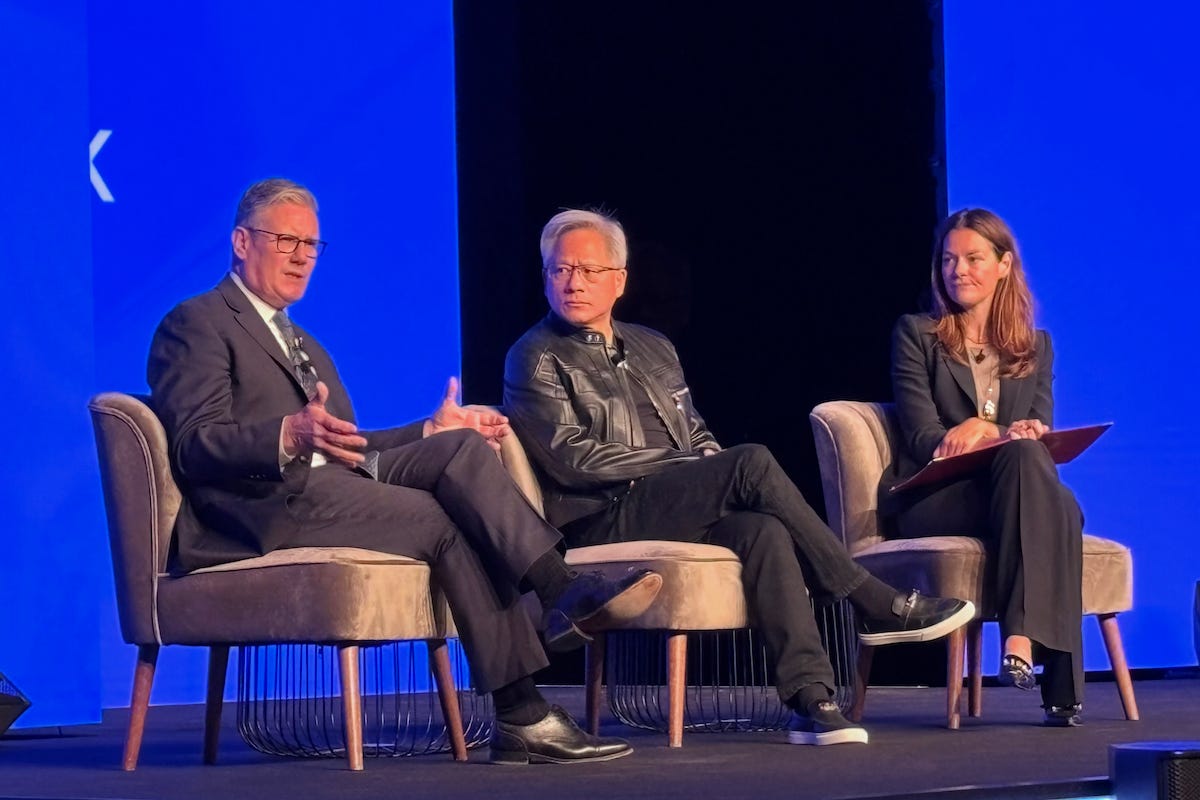Nvidia to Help UK’s AI Ecosystem Take Off with Infrastructure Push
The UK’s ‘Goldilocks’ position—rich in talent and capital, but lacking infrastructure—gets a major AI boost from global tech leader

Artificial intelligence isn’t just the next breakthrough technology—it’s becoming the core infrastructure of every modern economy. For Nvidia CEO Jensen Huang, the UK is poised to be a global hub of this new era, if it can overcome one major hurdle: a lack of AI infrastructure.
Speaking alongside UK Prime Minister Keir Starmer, Huang described the UK as having a “Goldilocks” moment for AI—just the right mix of research, startup innovation, and investment capital.
“The UK has one of the richest AI communities anywhere on the planet,” he said. “You have the deepest thinkers, the best universities, amazing startups, and you’re third in global AI venture capital investment. But you lack the infrastructure.”
To address that gap, Huang announced Nvidia’s plans to invest in building AI supercomputers in the UK, launch a new AI lab, and partner with the government to train a new generation of developers.
“We just need to get the flywheel going—research, startups, infrastructure, investment. It will take off,” he said.
The Engine the UK Needs
Huang’s core argument is that AI isn’t just software or algorithms—it’s infrastructure that underpins everything from science to government.
“It affects many industries—healthcare, education, manufacturing, finance, defense. Just as electricity and the internet became essential infrastructure, so will AI,” he said.
But the UK doesn’t have the computing horsepower to match its talent.
“If you’re a particle physicist, you need a linear accelerator. If you’re an astronomer, you need a telescope. If you do machine learning, you need a machine. That’s what’s missing here.”
The UK government is already responding. Starmer’s administration is backing plans to expand national computing capacity twentyfold.
“That’s why your announcement is so significant,” Huang told the Prime Minister in a panel discussion at the London Tech Week on June 9, 2025. “It enables researchers to do their life’s work and helps startups flourish.”
Starmer welcomed Nvidia’s commitment.
“The confidence it gives when you explain it that way is huge. Thank you for that vote of confidence,” he said. “We’re leaning into this—fast.”
Government as a Tech Partner
Starmer said the UK government doesn’t see AI alone as a private sector challenge.
“Governments can’t do this alone. Entrepreneurs can’t do this alone. It has to be done together,” he said.
He’s tasked Science Secretary Peter Kyle with embedding AI thinking across all departments.
“I’ve asked him to go to every department and ask, ‘How can AI help transform what you do?’ It’s not about doing more tech for tech’s sake—it’s about better services, greater efficiency, and stronger delivery.”
This “leaning in” isn’t just operational—it’s philosophical. Starmer views AI as an opportunity to improve lives at scale.
“Whether it's helping overburdened teachers, social workers, or NHS staff, this technology can amplify the human part of their jobs,” he said.
Huang agreed, calling the UK “a fantastic place for venture capital” and praising its human capital. “Your natural resource is your AI researchers and entrepreneurs. You have an abundance. You’re the envy of the world.”
AI for Everyone
A central focus of the conversation was skills—how to ensure the UK not only builds AI tools but also trains people to use them. Starmer announced a goal of training 7.5 million people across various sectors, emphasizing schools and universities.
“I’m really excited about the education pipeline,” he said. “I've got a 16-year-old boy and a 14-year-old girl, and they already understand AI and tech in a way that is difficult even to have conceived of a decade ago.”
Starmer emphasized the broader social mission behind this push. “Too often, kids think AI is for someone else. They’ve never seen it. You can’t aspire to something you’ve never been exposed to. We’re going to change that.”
Huang expanded on this, calling AI “the great equalizer.” Unlike traditional computer science, which required coding languages like Python or C++, today’s AI can be operated through natural language.
“The new programming language is human,” he said. “Most people don’t know code, but everyone knows how to ask a question.”
He illustrated the point vividly: “You can say to an AI, ‘You’re a poet steeped in Shakespeare—write me a sonnet about today’s keynote.’ And it will. Anyone can do this. That’s transformative.”
From Momentum to Movement
While announcing Nvidia’s AI lab and supercomputing investment in the UK, Huang emphasized the power of a well-functioning ecosystem.
“When you have infrastructure, researchers will come. When researchers do their work, startups form. When startups succeed, more investment follows. That’s the flywheel.”
Starmer echoed this vision and invited the industry to shape it.
“Everything in our AI action plan came from conversations with people in this room. It wasn’t made up in isolation.”
He challenged companies to go beyond passive support. “Put your fingerprints on this. Tell us what works. Tell us what doesn’t. We’ll do a better job if we co-create the ecosystem.”
Huang closed with a bold prediction: “Because of AI, every industry in the UK will become a tech industry. That’s the scale we’re talking about.”
And with AI advancing not just twice every 18 months—as in Moore’s Law—but a millionfold every decade, time is of the essence.
“You’ve got to get on the spaceship,” Huang said. “If you’re on board, everything else slows down. But if you’re not, you get left behind.”
Starmer’s final message was clear: “We’re in the top three globally. That’s an incredible place to start. Now we build—together.”


